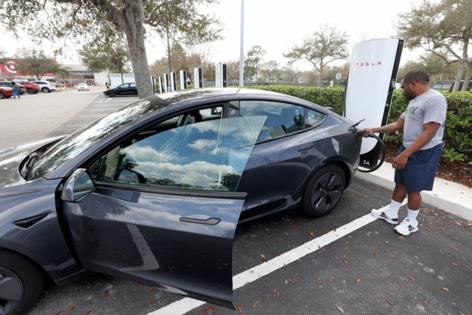'You can't beat the future': Electric vehicles on the rise in Central Florida
Published in Business News
Orlando resident Tyriq Green bought an electric vehicle to bypass the gas pump and likes that he’s on transportation’s cutting edge.
“I think everybody should start getting electric cars because, 20 to 25 years from now, there might not be as many gas cars,” said Green, who drives a Tesla Model 3 Performance. “You can’t beat the future. You’ve just got to ride with it.”
In Central Florida, the number of electric vehicle registrations rose more than 15% from November 2023 to November 2024, according to S&P Global Mobility, an automotive data and analytics company.
More than 17,000 electric vehicles, often called EVs, were newly registered in Brevard, Flagler, Lake, Marion, Orange, Osceola, Seminole, Sumter and Volusia counties during that period, the company said.
Despite that growth, electric vehicles represent just a sliver of what is on the road. There were 4,086,502 vehicles of all fuel types in operation as of October 1, 2024 in the region, S&P said, with about 63,270 of them electric vehicles — or 1.5%.
Still, electric vehicle adoption in Central Florida has generally grown faster than it has across Florida and the country, according to S&P data, with the 15.2% local increase last year topping the 9.4% national rate.
In Orange County alone, the number of fully electric and plug-in hybrid vehicle registrations climbed from 21,438 in April 2023 to 31,280 in April 2024 — a 46% increase.
Michael Brown moved to Central Florida last year to study cybersecurity at Full Sail University. The new Winter Park resident ditched his pickup truck and bought an electric vehicle both to avoid high gas prices and because the car is a symbol of what he sees as his high-tech future.
“You know how they say that if you want to be something, you have to work toward it?” Brown said of his Tesla Model 3. “I think that’s why I got this: It’s a good tech car.”
Electric vehicles comprised 8.1% of total vehicle sales in the United States last year, according to Kelley Blue Book. More than 1.3 million were sold last year, up about 7% from the 1.2 million sold in 2023, the car website said.
But it’s not clear what’s ahead for the EV market nationwide with the Trump administration moving to curb tax incentives for vehicle purchases and government subsidies for new charging stations.
Electric vehicles also remain a more-expensive purchase. The average price for electric cars was $55,544 in December, compared to $49,740 for gas-powered vehicles, Kelley Blue Book reported.
Green said he likes that electric vehicle charging stations allow him to avoid gas prices and gas stations.
“Anywhere you find an electric charging station, it’s in a nice area,” he said. “You don’t have to worry about gas stations. Just little stuff like that is cool.”
Crystal Stiles, executive director of development for Florida Power & Light, said Florida is second in the country for EV adoption, behind California.
“If you’re like the average American, you’re probably only driving 40 miles a day, so it’s pretty affordable,” she said. “So I think that’s why the industry has seen double digit growth over the last few years.”
But that quick growth has led to a lack of public EV chargers. Florida needs about 1,600 more public chargers than it has, according to data from the National Renewable Energy Laboratory.
FPL is adding more fast charging stations across the state, including two new sites in Deltona and Indialantic, with others planned for Daytona Beach and Port Canaveral later this year, Stiles said. But more are needed, she said, and other “private sector investors” need to help, she added.
There are at least 35 public EV charging stations in Orlando, including the Orlando Utilities Commission’s ReCharge Mobility Hub in downtown.
There are also Tesla Supercharger locations at select Wawa and Target locations across the city.
At the Target off University Boulevard and Goldenrod Road, Tesla owner Ismael Rosario stopped for a charge recently before heading to shop. He raved about the durability of his Model 3.
“They say that every 3,000 to 3,500 miles you need to come in for an oil change or to do a basic tune-up, but I haven’t done a tune-up” he said. “Since 2021, I’ve put 100,000-plus miles on this thing and have only invested in two sets of tires and six gallons of windshield wiper fluid. Nothing else.”
Tesla Model 3 and Tesla Model Y have been the most popular electric cars on Florida roads, comprising 46.7% of registered EVs through November 2024.
Stiles said Floridians’ interest in EVs likely won’t dim. “We expect it to continue to accelerate in the future.”
©2025 Orlando Sentinel. Visit at orlandosentinel.com. Distributed by Tribune Content Agency, LLC.












Comments